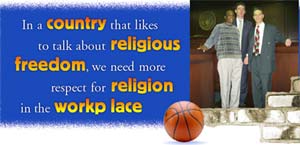The Real Deal
Todd R. McFarland September/October 2007
Getting your Trinity Audio player ready...

It was January 2005 and the annual basketball Mite League for 7- and 8-year-olds was scheduled to start in a couple of weeks. This program had been started by Lesure's boss, but Robert had taken it over a few years back, improved on it, and now it was his. Most basketball leagues are competitive affairs with individuals signing up for teams and playing one another. However, Lesure, who has a bachelor's degree in wellness, knew that 7- and 8-year-olds are not the most disciplined souls. Games often resemble a flock of geese following their mother rather than any type of organized sport. To remedy this, Lesure changed the program and essentially ran drills with the kids that he turned into games. They learned important basketball skills that would serve them well as they grew older.
The problem for Lesure in this was that the league was held Saturday mornings. This had not been a problem in the past, but Robert had started studying his Bible again. As a result he determined to abstain from secular work from sundown Friday to sundown Saturday.
Lesure, though he had become a Sabbathkeeper years before, had drifted away from observing the Sabbath over the past several years. Ever since he worked for the city of Albany, he had worked, if required, on Sabbath. During the summer of 2004, though, Robert had rearranged his schedule so that he no longer worked on Saturdays.
Robert's immediate supervisor was not excited about Robert not being able to work on Saturday mornings anymore. When Robert asked him for a religious accommodation, he did more than just refuse; he made sure Lesure had to choose between his faith and his job. Originally Robert would have been required to work only the six Saturdays that the Mite League ran. Under the city's progressive discipline problem, Lesure could have missed all of these Saturday mornings and not been fired. So Robert was given a "new" schedule. From then on he would be required to work every other Saturday morning. Further, the other worker at his facility who had been working Saturday mornings was moved to a different, smaller facility.
As Robert began to accumulate absences, he continued to work toward a solution. He asked if there were any other jobs with the city he could transfer to; he was told there were none. He also asked if there were any workers who could swap with him and cover his Saturday mornings. Since the Parks Department workers are spread out over several different facilities, he could not ask them himself. The city said they would ask, and then reported back to him that after checking with all the eligible workers, no one was willing to swap with him.
As Robert got more absences he was suspended and warned not to miss more work. When he still refused to violate his conscience, he soon found himself terminated. The city claimed it had done all that it could do. It needed to keep its facilities open on Saturdays and had a limited number of workers with which to do that. Since no one was willing to work his shift, it had no choice but to fire him and replace him with someone who could work on Saturdays.
Robert filed a complaint with the Equal Employment Opportunities Commission (EEOC), claiming religious discrimination. However, he soon discovered that when it comes to discrimination, religion is often the neglected category by the EEOC. After conducting its "investigation," the EEOC determined that it could not find cause that Lesure was discriminated against because of his religion. As Robert would learn later, the EEOC came to the conclusion by accepting nearly everything the city said at face value and ignoring what he said.
Religion cases are different than most other forms of discrimination. In cases of race, national origin, or gender discrimination, the question is whether the employer treated the employee differently because of his or her "protected class"; i.e., had the employer treated the woman or Black employee differently because of gender or race. Since employers would never admit that they fired the employee because of a protected category, the employee had to prove that he or she was not fired for whatever reason the employer gave, but because the employer had an animus against Black persons. This is called "pretext" in the world of employment lawyers; the stated reason for the termination was a pretext for the real reason, which is race.
In religious discrimination cases, pretext is rarely the issue. There is usually no question that the employee was fired because of his or her religion. The question is almost always whether or not the employer could have accommodated the employee's religious needs without causing undue hardship.

What is and is not an undue hardship is a different article. But in a nutshell it is anything that is more than a minimal cost to the employer. What is important, though, is that to evaluate a religious accommodation case it is crucial that the EEOC learn about the business practices of the employer. It is crucial to understand how the employer conducts its business operations so that the employer's claim of undue hardship can be evaluated.
Unfortunately for employees, this is a job at which the EEOC often fails spectacularly. Since religion makes up only a little more than 3 percent of the EEOC's caseload, an investigator can go a long time without handling one, if they ever do. In the absence of experience or training on handling religion cases, many times the investigator will treat the religion case like their other cases and focus on whether derogatory comments were made about the employee's religion and whether other employees were fired for similar offenses. Some investigators have gone so far as to say the EEOC cares only about race and gender cases. In one case (not Lesure's) the letter to the employee stated that there was no evidence that religion was a factor in his termination despite the fact his refusal to work on Sabbath morning was the only reason he was terminated. The letter made no reference to undue hardship. There are of course exceptions to this. There are EEOC personnel who take religious discrimination cases seriously and do a good job investigating them. But nationwide, religion cases are often as mishandled as Robert's was.
For many victims of religious discrimination, a refusal by the EEOC to find that discrimination and represent the employee means the end of the case. Fortunately for Lesure, this was not the case. He made contact with the Seventh-day Adventist Church, which provided representation to him even though he was not a member. Counsel in Atlanta was retained for Lesure in the form of Jay Rollins and Larry Kosten of Thompson, Rollins & Schwartz. A suit was filed in federal court, and the case started.
The first part of any lawsuit is when each side gets to find out what the other side knows. This is done via written questions, depositions, and requests for documents. It was at this point that Robert's case took a turn for the better. It is during this part of the suit that Robert's lawyers were able to test all of the city's claims and investigate the case in a way the EEOC didn't.
The first thing Lesure learned was that the city did not ask every employee if they would swap shifts with Robert. The two who were deposed said they were not asked, and one said he would have swapped; the other said he would have thought about it and might have. It also turned out that several of the representations the city made to him and the EEOC with regard to staffing and why individuals were moved to different facilities were not accurate. He also learned that shortly after he was fired the city shut down its gyms on Saturday for budget reasons. On top of this he also discovered that the city had not been paying him required overtime pay.
As the city's case began to crumble, to its credit, it became willing to face reality. Without compromising the city's legal position, counsel representing the city expressed a willingness to settle the case. However, budgets being what they were, it did not have a lot of money for Lesure, but it did have a job for him. The city was getting ready to open up a new facility that had an opening for someone with a degree in wellness.
The city proposed giving Robert a new job, at a substantially higher salary that would better use his education, skills, and more closely match his interests, but giving him less cash as part of his settlement. While Robert was not excited about getting less cash in hand than he was entitled to, he knew that with the higher paying job he would be economically ahead in a few short years. Further, the new job was doing something that he loved to do. With the supervisor and other personnel who had caused him problems gone, Robert accepted the city's proposal.
Cases do not always work out this well for both sides. Few employers are willing to even tacitly admit they did anything wrong by rehiring the employee. (In this case the city of Albany did not admit to any wrongdoing in settling the case.) Further, employees can be reluctant to go back to work for an employer they feel mistreated them. But when both sides are willing to compromise and find a solution that meets everyone's needs, as opposed to wants, many times a deal can be struck.
As Robert's case demonstrates, to get to that point requires a significant amount of work and resources. Given the current state of the law, religious discrimination cases are difficult to win, and many times employers have few incentives to come to the table. This is something that needs to be changed. In a country that likes to talk about religious freedom, we need more respect for religion in the workplace. Measures such as the Workplace Religious Freedom Act now pending in Congress are a good place to start. Another needed reform is improvement in the way the EEOC, the agency charged with enforcing these laws, handles these cases. It is time the United States quits giving lip service to the principle of religious freedom and starts doing something real about it.
Todd R. McFarland is associate general counsel for the Seventh-day Advenstis Church. He writes from Silver Spring, Maryland